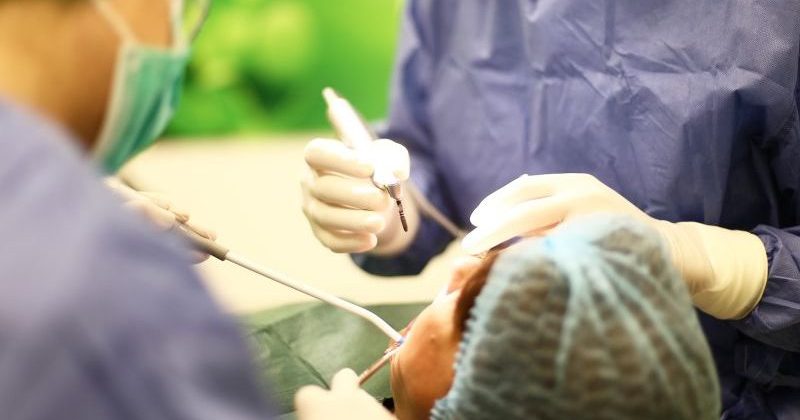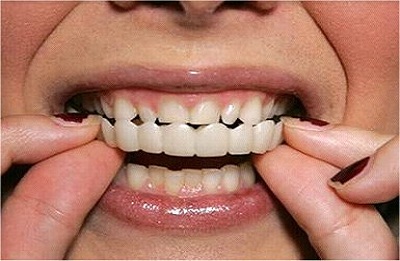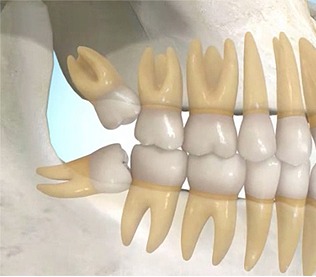
Your dentist or oral surgeon may use one of three types of anesthesia, depending on the expected complexity of the wisdom tooth extraction and your comfort level. Options include: Local anesthesia. Your dentist or oral surgeon administers local anesthesia with one or more injections near the site of each extraction.
What are impacted wisdom teeth and how are they treated?
Apr 21, 2022 · Pain in the wisdom teeth is a completely normal occurrence and will resolve on its own with time. However, in some cases, they will either need active home management or treatment in a hospital or dental clinic.This article will list out some simple ways how you can deal with wisdom teeth pain safely.
What is involved in wisdom teeth removal?
Wisdom teeth that have partially come through can give bacteria a place to enter the gums and create a place for infection to occur. This may also lead to pain, swelling and stiffness in your jaw. Wisdom teeth that don’t have room to come through are thought by some to crowd or damage neighboring teeth.
What type of anesthesia is used for wisdom tooth extraction?
Apr 27, 2018 · Sedation meds: During the extraction of wisdom teeth there can be several different combinations of medications used for intravenous sedation and local anesthesia. Most commonly, Lidocaine is the local anethesia of choice. Sedation medications can include but are not limited to midazolam, fentanyl, Propofol and decadron (dexamethasone).
What can I take for pain after wisdom teeth removal?
Oct 28, 2021 · Recovery Healing. Your dentist or surgeon will give you extra gauze to use on the extraction site at home. If you have bleeding... Pain Relief. In some cases, your surgeon may prescribe pain medicine, which can include opioids such as hydrocodone and... Eating and Drinking. Your dentist will give ...

Where are wisdom teeth removed?
Wisdom Teeth Removal. Your wisdom teeth are the last teeth in the back of your mouth's top and bottom rows (also known as your third morals) and are your last teeth to erupt. In some cases, your wisdom teeth will not be able to erupt into your mouth at the proper angle without disrupting your bite or the surrounding teeth.
What is general anesthesia?
General anesthesia involves your dentist administering oral, intravenous (IV), or inhalable medications (or a combination thereof) to place you into an unconscious state. Rest assured that from your perspective, it will feel similar to falling asleep and waking up.
What are the risks of local anesthesia?
According to the National Health Service, risks associated with local anesthesia may include: 1 Neurological symptoms (such as the feeling of pins and needles) 2 Allergic reaction and cardiac symptoms (rarely) 3 Dizziness or blurred vision 4 Muscle spasms 5 Headaches
What are the symptoms of anesthesia?
Neurological symptoms (such as the feeling of pins and needles) Allergic reaction and cardiac symptoms (rarely) Dizziness or blurred vision. Muscle spasms. Headaches. You should be able to drive yourself home after local anesthesia safely, and your affected area should regain sensation within several hours.
Does anesthesia make you unconscious?
This ensures that you don’t feel pain (or any sensation at all!) from the numbed area. Local anesthesia will not put you to sleep, make you unconscious, or change how you feel at all outside of the affected area.
Can you get anesthesia for wisdom teeth removal?
General anesthesia is not typically required for the removal of your wisdom teeth. Your dental professional may recommend this option in some cases, especially if the procedure is lengthy, complicated or if you experience high levels of stress. General anesthesia involves your dentist administering oral, intravenous (IV), or inhalable medications (or a combination thereof) to place you into an unconscious state.
Can you use sedation for wisdom teeth?
According to the American Association of Oral and Maxillofacial Surgeons, sedation is used in some cases during the treatment of impacted wisdom teeth. Depending on the medications used and their dosage, you could be in one of three types of sedation:
Why do you need wisdom teeth removed?
Every patient is unique, but in general, wisdom teeth may need to be removed when there is evidence of changes in the mouth such as: Your dentist may also recommend removal of wisdom teeth as part of treatment for braces or other dental care.
Why should wisdom teeth be monitored?
As people age, they are at greater risk for health problems —and that includes potential problems with their wisdom teeth. Be sure to, floss around your wisdom teeth and visit your dentist regularly. Regular dental visits allow your dentist to evaluate your wisdom teeth and your overall dental health.
How do you know if you have wisdom teeth?
As your wisdom teeth make their way through your gums, your dentist will be monitoring your mouth for signs of the following: 1 Wisdom teeth that aren’t in the right position can allow food to become trapped. That gives cavity-causing bacteria a place to grow. 2 Wisdom teeth that haven’t come in properly, which can make it difficult to floss between the wisdom teeth and the molars next to them. 3 Wisdom teeth that have partially come through can give bacteria a place to enter the gums and create a place for infection to occur. This may also lead to pain, swelling and stiffness in your jaw. 4 Wisdom teeth that don’t have room to come through are thought by some to crowd or damage neighboring teeth. 5 A wisdom tooth that is impacted can form a cyst on or near the impacted tooth. This could damage the roots of nearby teeth or destroy the bone that supports your teeth.
Why are wisdom teeth called wisdom teeth?
Historically, these teeth have been called wisdom teeth because they come through at a more mature age. When they come through correctly, healthy wisdom teeth can help you chew. It’s normal to feel a little discomfort when your wisdom teeth appear, but if you have pain, see your dentist immediately.
When do wisdom teeth come out?
Specifically, wisdom teeth. Your mouth goes through many changes in your lifetime. One major dental milestone that usually takes place between the ages of 17 and 21 is the appearance of your third molars. Historically, these teeth have been called wisdom teeth because they come through at a more mature age.
Why is flossing difficult between wisdom teeth?
Wisdom teeth that aren’t in the right position can allow food to become trapped. That gives cavity-causing bacteria a place to grow. Wisdom teeth that haven’t come in properly , which can make it difficult to floss between the wisdom teeth and the molars next to them.
Can wisdom teeth cause pain?
This may also lead to pain, swelling and stiffness in your jaw. Wisdom teeth that don’t have room to come through are thought by some to crowd or damage neighboring teeth. A wisdom tooth that is impacted can form a cyst on or near the impacted tooth.
How long does it take to get answers from a doctor?
Ask U.S. doctors your own question and get educational, text answers — it's anonymous and free! Doctors typically provide answers within 24 hours. Educational text answers on HealthTap are not intended for individual diagnosis, treatment or prescription. For these, please consult a doctor (virtually or in person).
Is HealthTap a doctor-patient relationship?
Disclaimer: Content on HealthTap (including answers) should not be used for medical advice, diagnosis, or treatment, and interactions on HealthTap do not create a doctor-patient relationship. Never disregard or delay professional medical advice in person because of anything on HealthTap.
Can you get anesthesia for a tooth extraction?
If there are especially impacted teeth then some sedation might be indicated. It is rare that a full general anesthetic would be needed for dental extraction.
Does zilactin help with cold sores?
Mouth Blisters: Zilactin is an over the counter product that helps relieve the pain associated with mouth sores / blisters / cold sores and apthous ulcers . If someone has any of these sores in their mouth they should stay away from citrus juices and spicy sauces, as well, to help prevent painful episodes.
Can you use HealthTap for medical advice?
Content on HealthTap (including answers) should not be used for medical advice, diagnosis, or treatment, and interactions on HealthTap do not create a doctor-patient relationship. Never disregard or delay professional medical advice in person because of anything on HealthTap. Call your doctor or 911 if you think you may have a medical emergency.
Can wisdom teeth be removed at the same time?
IV sedation: Typically, all the wisdom teeth are removed at the same time, using IV sedation. An IV is placed and then medication is injected into the line. This allows the surgeon to titrate (control the amount and effect of) the medications much more accurately and safely, than if they were taken orally.
What is the best medicine for wisdom tooth pain?
Over-the-counter pain medicine such as Tylenol (acetaminophen) and Advil (ibuprofen) are usually effective for pain after wisdom tooth extraction. 10 You might also try putting a bag of ice or a cold damp washcloth on your face to help with swelling and pain. 7
What is wisdom tooth removal?
Wisdom teeth removal surgery is an outpatient procedure that is typically performed by a dentist or oral surgeon. A dentist will recommend this surgery if an exam and X-rays reveal that your wisdom teeth are impacted or may cause dental problems for you in the future. (Not everyone has wisdom teeth, but most people have one to four.)
What happens after a dental procedure?
Immediately after surgery, you may feel mild effects of the anesthesia, including nausea, dizziness, and shivering. 2 . You'll be brought to a recovery room where you will be monitored.
How to prepare for surgery?
How to Prepare. Ask your surgeon about any concerns you have before the procedure. They can tell you what to do in the days before surgery and how to plan for recovery time afterward. They can also talk to you about the type of anesthesia that will be used and how you’ll feel after the surgery.
How long does it take to recover from wisdom tooth removal?
For a successful recovery, it's important to closely follow the post-operative instructions you receive, particularly during the first seven to 10 days following your procedure.
How to stop bleeding after tooth extraction?
Don’t drink alcohol or use mouthwash with alcohol. Avoid brushing your teeth next to the extraction site. Use a soft manual toothbrush, which is gentler than an electric one. 7 . Some pain, bleeding, and swelling in your mouth and cheeks are likely to persist for up to several days after the surgery.
What are the complications of wisdom teeth removal?
Complications of wisdom teeth removal surgery can include: 1 . Dry socket, a painful condition that can occur if a post-surgery blood clot gets dislodged from the extraction site, causing the bone and nerves underneath to become exposed. Irritated nerves. Sinus problems. Infection.
What is sedation dentistry?
Sedation dentistry includes all dental procedures that are done after the patient has been administered medication that numbs, calms and relaxes them. There are many types of substances that can be used and the concentration will be set by the anesthesia team in the least invasive way possible.
Can you be asleep during IV sedation?
IV Sedation. During IV sedation you will still be conscious, but groggy and even close to falling asleep. It will not let you remember much during the appointment, so it is a great solution for lengthy procedures such as multiple wisdom teeth removals. General Anesthesia.
Can wisdom teeth be removed?
They are often crooked and grow in a jaw that has become too small for them. Removing wisdom teeth isn’t recommended in all cases, but if you do have decay or if they grow in the wrong direction, extraction might be the best option. If you are afraid about the procedure, then dental sedation might ease your anxiety.
When do you get your third set of wisdom teeth?
Wisdom teeth. September 25, 2017. Between the ages of 17 and 21, most people get a third set of molars, also known as wisdom teeth. In some situations there may not be enough room for the teeth and they may not be able to fully erupt, or push past the gums.
Should wisdom teeth be removed?
Though it’s generally agreed that wisdom teeth should be removed if they are causing problems, such as infection, frequent pain, damage to adjacent teeth or other immediate difficulties, dentists debate about what to do when they aren’t causing issues.

Overview
Why It's Done
- Wisdom teeth, or third molars, are the last permanent teeth to appear (erupt) in the mouth. These teeth usually appear between the ages of 17 and 25. Some people never develop wisdom teeth. For others, wisdom teeth erupt normally — just as their other molars did — and cause no problems. Many people develop impacted wisdom teeth — teeth that don't have enough room to …
Risks
- Most wisdom tooth extractions don't result in long-term complications. However, removal of impacted wisdom teeth occasionally requires a surgical approach that involves making an incision in the gum tissue and removing bone. Rarely, complications can include: 1. Painful dry socket, or exposure of bone when the post-surgical blood clot is lost from the site of the surgica…
How You Prepare
- Your dentist may perform the procedure in the office. However, if your tooth is deeply impacted or if the extraction requires an in-depth surgical approach, your dentist may suggest you see an oral surgeon. In addition to making the area numb with local anesthetic, your surgeon may suggest sedation to allow you to be more comfortable during the procedure.
What You Can Expect
- During the procedure
Your dentist or oral surgeon may use one of three types of anesthesia, depending on the expected complexity of the wisdom tooth extraction and your comfort level. Options include: 1. Local anesthesia.Your dentist or oral surgeon administers local anesthesia with one or more injection… - After the procedure
If you receive sedation anesthesia or general anesthesia, you're taken to a recovery room after the procedure. If you have local anesthesia, your brief recovery time is likely in the dental chair. As you heal from your surgery, follow your dentist's instructions on: 1. Bleeding.Some oozing of blood …
Results
- You probably won't need a follow-up appointment after a wisdom tooth extraction if: 1. You don't need stitches removed 2. No complications arose during the procedure 3. You don't experience persistent problems, such as pain, swelling, numbness or bleeding — complications that might indicate infection, nerve damage or other problems If complications develop, contact your denti…